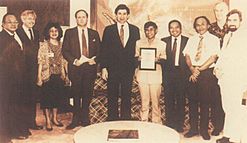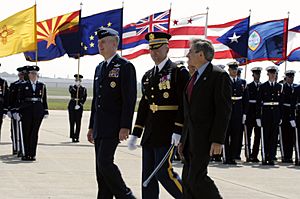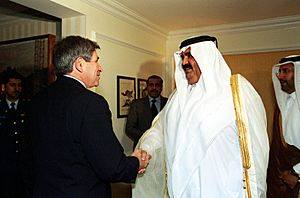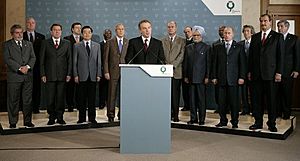Paul Wolfowitz facts for kids
Quick facts for kids
Paul Wolfowitz
|
|
|---|---|
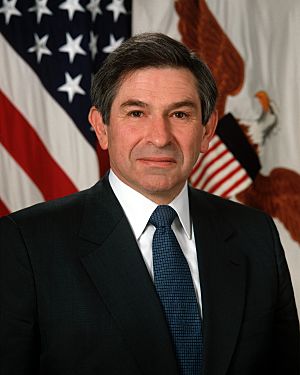
Official portrait, 2001
|
|
| 10th President of the World Bank Group | |
| In office June 1, 2005 – June 30, 2007 |
|
| Preceded by | James Wolfensohn |
| Succeeded by | Robert Zoellick |
| 28th United States Deputy Secretary of Defense | |
| In office March 2, 2001 – June 1, 2005 |
|
| President | George W. Bush |
| Secretary | Donald Rumsfeld |
| Preceded by | Rudy de Leon |
| Succeeded by | Gordon England |
| 5th Dean of the Paul H. Nitze School of Advanced International Studies | |
| In office 1994–2001 |
|
| Preceded by | George R. Packard |
| Succeeded by | Jessica Einhorn |
| Under Secretary of Defense for Policy | |
| In office May 15, 1989 – January 19, 1993 |
|
| President | George H. W. Bush |
| Preceded by | Fred Iklé |
| Succeeded by | Frank G. Wisner |
| United States Ambassador to Indonesia | |
| In office April 11, 1986 – May 12, 1989 |
|
| President | Ronald Reagan George H. W. Bush |
| Preceded by | John H. Holdridge |
| Succeeded by | John Cameron Monjo |
| 16th Assistant Secretary of State for East Asian and Pacific Affairs | |
| In office December 22, 1982 – March 12, 1986 |
|
| President | Ronald Reagan |
| Preceded by | John H. Holdridge |
| Succeeded by | Gaston J. Sigur Jr. |
| 12th Director of Policy Planning | |
| In office February 13, 1981 – December 22, 1982 |
|
| President | Ronald Reagan |
| Preceded by | Anthony Lake |
| Succeeded by | Stephen W. Bosworth |
| Personal details | |
| Born | December 22, 1943 Brooklyn, New York, U.S. |
| Political party | Democratic (before 1981) Republican (1981–present) |
| Spouse | |
| Children | 3 |
| Education | Cornell University (BA) University of Chicago (MA, PhD) |
Paul Dundes Wolfowitz (born December 22, 1943) is an American political scientist and diplomat. He has held several important roles in the United States government and international organizations. These include serving as the 10th President of the World Bank, U.S. Deputy Secretary of Defense, and U.S. Ambassador to Indonesia. He was also the dean of the Paul H. Nitze School of Advanced International Studies (SAIS) at Johns Hopkins University.
Wolfowitz was a strong supporter of the Iraq War before it began. He is often described as one of the "architects" of the war. He is also known as a leading figure in neoconservatism, a political idea that supports using American power to promote democracy around the world.
In 2005, he became the president of the World Bank. He resigned after two years due to a controversy involving a staff member. A report described his time there as a "battle over his leadership" because of his involvement in a promotion for a colleague. Wolfowitz is the only World Bank president to have resigned because of a scandal. He is currently a visiting scholar at the American Enterprise Institute.
Contents
- Early Life and Family Background
- Career in Government and Policy
- Working on Arms Control and Defense Policy
- Deputy Assistant Secretary of Defense Role
- Director of Policy Planning at the State Department
- Assistant Secretary for East Asian and Pacific Affairs
- Serving as Ambassador to Indonesia
- Undersecretary of Defense for Policy
- Dean at Johns Hopkins University
- Deputy Secretary of Defense Role Again
- President of the World Bank
- Recent Activities and Public Life
- See also
Early Life and Family Background
Paul Wolfowitz was born in Brownsville, Brooklyn, New York, on December 22, 1943. He was the second child of Jacob Wolfowitz and Lillian Dundes. His family had immigrated from Poland. He grew up mostly in Ithaca, New York, where his father was a professor at Cornell University.
As a student, Paul Wolfowitz was deeply affected by a book called Hiroshima. This book helped shape his views on the world. His father's family had faced great hardship, which also influenced him.
In the 1960s, while at Cornell, he met Clare Selgin. They married in 1968 and had three children. They later divorced in 2002. Wolfowitz can speak five languages besides English: Arabic, French, German, Hebrew, and Indonesian.
Paul Wolfowitz's Education Journey
Wolfowitz started attending Cornell University in 1961. He was a member of the Quill and Dagger society. In 1963, he joined the civil rights march on Washington with his mother. He graduated in 1965 with a degree in mathematics.
He then decided to study political science in graduate school. He later said that he chose this path because he wanted to help prevent nuclear war. In 1972, he earned his Ph.D. in political science from the University of Chicago. His doctoral paper was about preventing the spread of nuclear weapons in the Middle East.
While finishing his studies, Wolfowitz taught at Yale University from 1970 to 1972.
Career in Government and Policy
Working on Arms Control and Defense Policy
In the 1970s, Wolfowitz worked as an aide to Senator Henry M. Jackson. Senator Jackson was a Democrat who supported strong military spending and a firm stance against the Soviet Union.
In 1972, Wolfowitz joined the Arms Control and Disarmament Agency (ACDA). He wrote research papers and helped with talks about limiting strategic weapons. He also worked to stop South Korea from developing nuclear weapons.
Later, under President Gerald Ford, Wolfowitz was part of a group called Team B. This team looked at how American intelligence agencies were understanding the threat from the Soviet Union. Team B's report suggested that the Soviet Union was a greater threat than previously thought. Wolfowitz played a key role in this team, focusing on Soviet missile strategy.
In 1978, Wolfowitz was investigated by the FBI. He was accused of sharing a classified document about U.S. weapons sales with an Israeli official. The investigation was later dropped, and he was not charged.
Deputy Assistant Secretary of Defense Role
In 1977, during the Carter administration, Wolfowitz moved to the Pentagon. He became the US Deputy Assistant Secretary of Defense for Regional Programs. He worked under US Secretary of Defense Harold Brown.
In 1980, Wolfowitz left the Pentagon and became a visiting professor at Johns Hopkins University. Around this time, he joined the Republican Party. He believed that the Democratic Party had changed its views on international relations.
Director of Policy Planning at the State Department
After Ronald Reagan became president in 1980, Wolfowitz was offered the position of Director of Policy Planning at the Department of State.
President Reagan's foreign policy was influenced by the idea that it was hard to make dictatorships into democracies quickly. However, Wolfowitz disagreed with this view. He spoke out against Saddam Hussein of Iraq, even when others were supporting him. Wolfowitz strongly believed in democratic ideals and felt it was important to oppose leaders who were tyrants. He also supported Israel in the Reagan administration.
Wolfowitz also challenged the US policy towards China. He argued that the US should not make too many concessions to China. He believed China needed the US more than the US needed China, especially against the Soviet Union. Despite some disagreements with the Secretary of State, Wolfowitz was later promoted.
Assistant Secretary for East Asian and Pacific Affairs
In 1982, Wolfowitz was appointed Assistant Secretary of State for East Asian and Pacific Affairs.
He worked to change the administration's policy towards the Philippines. After the assassination of a Philippine opposition leader, many feared the country could fall to communists. Wolfowitz argued that "The best antidote to Communism is democracy." He visited Manila and met with opposition leaders, pushing for democratic reforms. Eventually, the US supported the democratic government of Corazón Aquino.
Serving as Ambassador to Indonesia
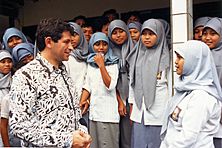
From 1986 to 1989, Wolfowitz served as the US ambassador to the Republic of Indonesia. This was during the military-backed government of President Suharto.
His time as ambassador was seen as a success. He learned the Indonesian language and immersed himself in the culture. He visited schools, climbed volcanoes, and explored Jakarta. He quietly worked to encourage political and economic reforms. He also showed concern about corruption, even canceling food aid to the Indonesian government when he suspected Suharto's family was unfairly benefiting.
Wolfowitz later wrote about the "Tragedy of Suharto," noting that the greed of Suharto's children contributed to Indonesia's financial problems.
Undersecretary of Defense for Policy
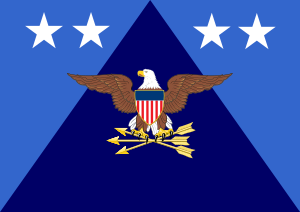
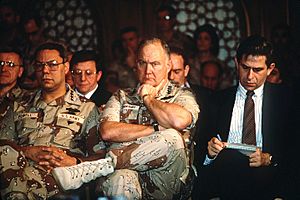
From 1989 to 1993, Wolfowitz worked in the administration of George H. W. Bush. He was the Under Secretary of Defense for Policy under US Secretary of Defense Dick Cheney. During the 1991 Persian Gulf War, his team helped coordinate military strategy. They also helped raise $50 billion in financial support from other countries for the operation.
Wolfowitz believed that the opportunity to remove Saddam Hussein was missed right after the war. He was upset that Saddam Hussein's forces were allowed to harm people who were rebelling against him.
After the 1991 Persian Gulf War, Wolfowitz and his assistant wrote a document called the "Defense Planning Guidance of 1992." This document, known as the Wolfowitz Doctrine, suggested that the US should prevent any new rival from becoming too powerful. It also proposed that the US should maintain strong military power and be ready to act alone if needed. Many of these ideas later became part of the Bush Doctrine.
Dean at Johns Hopkins University
From 1994 to 2001, Wolfowitz was a professor and Dean at the Paul H. Nitze School of Advanced International Studies (SAIS) at Johns Hopkins University. He helped raise a lot of money for the university and improved its international finance programs.
During this time, Wolfowitz was also involved with the Project for the New American Century (PNAC). This group supported the idea of the US having a strong global presence to protect its interests. In 1998, he stated that the US government needed to be more determined to remove Saddam Hussein.
In 2000, the PNAC released a report suggesting that the US should have military bases around the world. During the 2000 US presidential election campaign, Wolfowitz advised George W. Bush on foreign policy.
Deputy Secretary of Defense Role Again
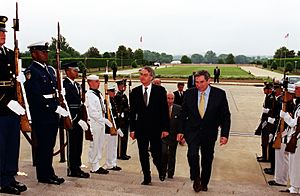
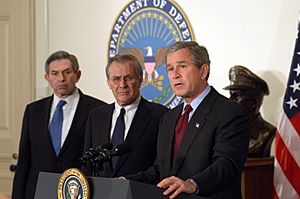
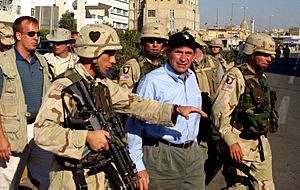
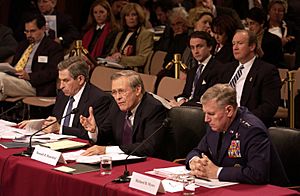
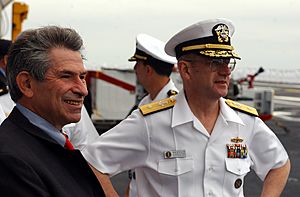
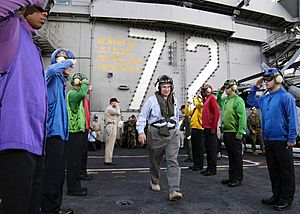
From 2001 to 2005, Paul Wolfowitz served as U.S. Deputy Secretary of Defense under Secretary Donald Rumsfeld during the George W. Bush administration.
The September 11 attacks in 2001 greatly changed US policy. Wolfowitz saw these attacks as a "wake-up call" to prevent future terrorist attacks, especially with dangerous weapons. Soon after the attacks, Rumsfeld and Wolfowitz discussed taking action against Iraq. They believed Iraq was a weak government that could be easily changed. They pushed for a policy that would later be called the Bush Doctrine, which focused on taking action before threats became too big.
After the September 11 attacks, the US invaded Afghanistan to fight Al-Qaeda. Wolfowitz believed the US could handle the situation without much help from allies. Later, he visited Kabul, Afghanistan, and said that the priority was now stability and rebuilding the country.
In 2002, Wolfowitz spoke at a rally in Washington supporting Israel. He emphasized that President Bush stood with Israel but also acknowledged the suffering of innocent Palestinians.
The Bush administration then began planning for the next stage of the War on Terror. Wolfowitz believed that a free Iraq could be a model for other countries in the Middle East. The 2003 invasion of Iraq began on March 19, 2003. Before the invasion, Wolfowitz stated that the main reason for action was Iraq's weapons of mass destruction.
The Pentagon created a new group called the Office of Special Plans (OSP). This group was meant to find evidence that Saddam Hussein had ties to Al Qaeda and dangerous weapons. The OSP used information from various sources, including an Iraqi exile group. Some people criticized the OSP, saying it was created to find information that supported the policy of going to war.
Wolfowitz believed the invasion of Iraq would need few troops. He thought that Iraqi oil revenues would pay for the country's rebuilding. However, these predictions turned out to be incorrect. He also disagreed with a general's estimate that hundreds of thousands of troops would be needed for stability after the war.
In October 2003, while in Baghdad, Wolfowitz narrowly escaped a rocket attack at his hotel.
President of the World Bank
In March 2005, President George W. Bush nominated Wolfowitz to be president of the World Bank. Some people, including a Nobel Prize winner and former World Bank economist, criticized his nomination. They worried that he lacked experience in development and that his appointment might cause protests. However, others praised his nomination, saying he was willing to speak out against dictators.
Wolfowitz became president on June 1, 2005. He attended the 31st G8 summit to discuss climate change and economic development in Africa. He was present at a press conference with British Prime Minister Tony Blair when the July 7, 2005 London bombings occurred.
Some of Wolfowitz's early appointments at the World Bank were controversial. He focused strongly on two main issues: improving living standards in Sub-Saharan Africa and fighting corruption. He traveled widely in Africa to address these issues. His efforts to fight corruption also caused some debate. Member countries were concerned that his decisions to stop lending money to countries might be influenced by US foreign policy.
Recent Activities and Public Life
Paul Wolfowitz is currently a visiting scholar at the American Enterprise Institute. He writes articles and participates in events for the group.
He was a member of the steering committee for the Bilderberg group, a private conference of influential people.
In February 2013, Wolfowitz publicly supported legal recognition for same-sex marriage. He submitted a legal document to the US Supreme Court in support of it.
In 2015, he advised presidential candidate Jeb Bush. In 2016, he initially said he would vote for Hillary Clinton in the 2016 United States presidential election, but later stated he did not vote for her.
In January 2017, Wolfowitz wrote an opinion piece in The New York Times. He commented on a letter signed by many Foreign Service Officers who criticized President Trump's executive action on immigration.
In February 2023, Wolfowitz received the Order of Brilliant Star with Grand Cordon from President of the Republic of China Tsai Ing-wen.
See also
 In Spanish: Paul Wolfowitz para niños
In Spanish: Paul Wolfowitz para niños
- Joint Vision 2020
- Washington Institute for Near East Policy (WINEP)
- World Bank Group
 | Misty Copeland |
 | Raven Wilkinson |
 | Debra Austin |
 | Aesha Ash |


